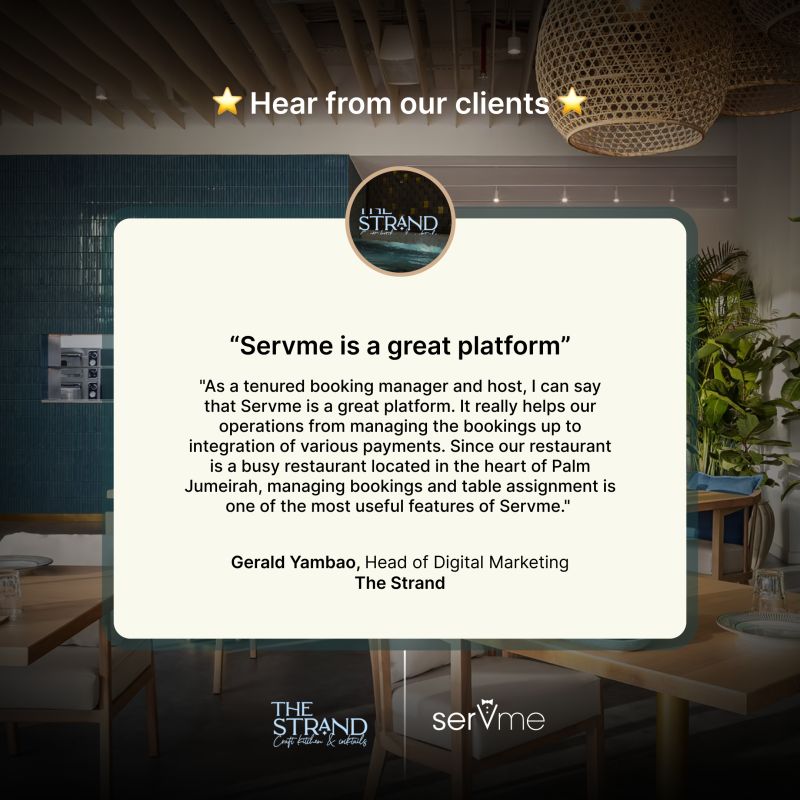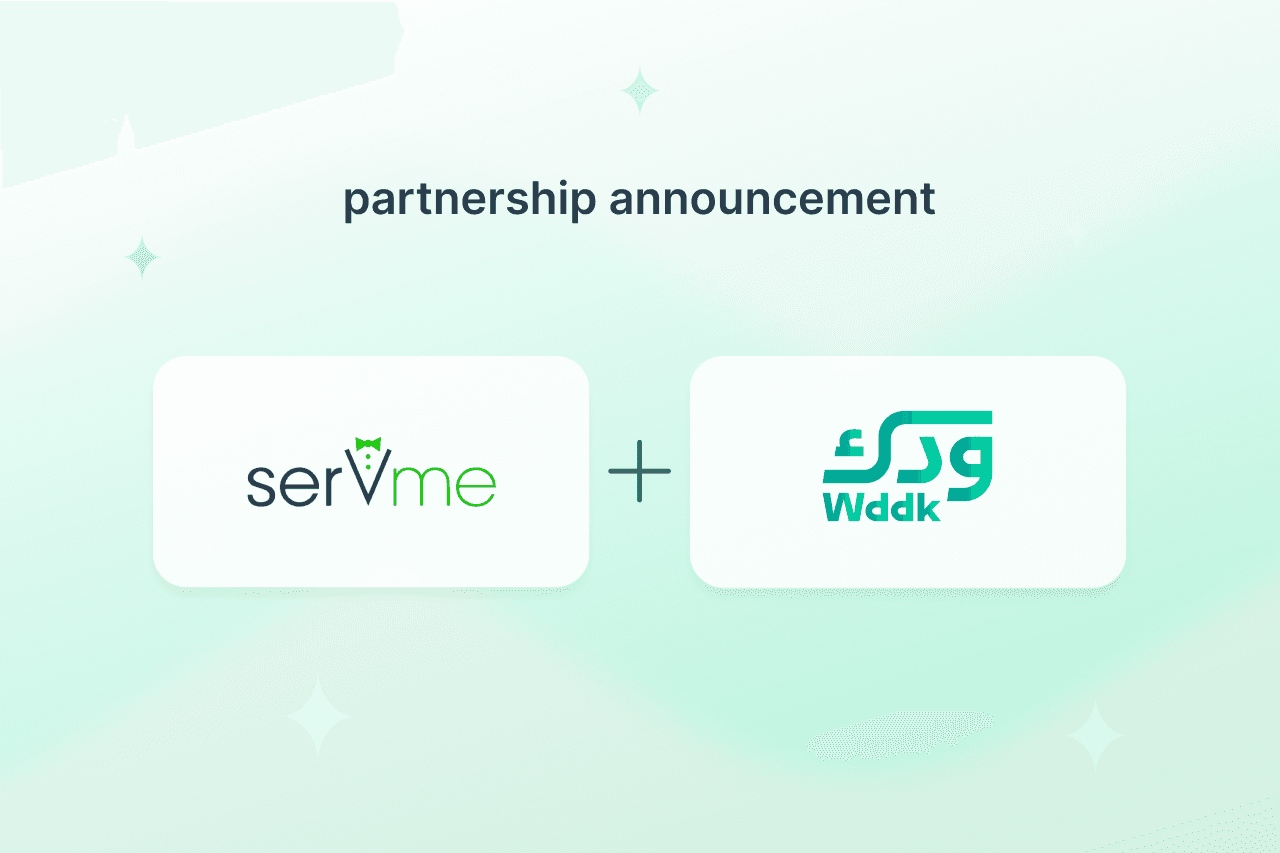If you’re researching SevenRooms competitors, you’re likely evaluating whether the platform is still the right fit for your restaurant or hospitality group.
Today, single and multi-venue restaurants and hospitality groups use platforms like Servme and SevenRooms to manage guest data, reporting, and day-to-day operations across their venues.
The reservation platform acts a complete restaurant management system.
However, as many operators discover during evaluation, SevenRooms is not always the most accessible option. Particularly when pricing is considered. SevenRooms doesn’t provide pricing anywhere on its site.
However, online reports suggest SevenRooms pricing ranges from $700 to $1,000 per month, representing a significant investment for restaurants that are just opening or scaling.
Not to mention, many reviews via TrustPilot show customers struggling to cancel their SevenRooms subscription. Similarly, diners making online reservations are unhappy with the platform too. Many report going to different restaurants because of the tons of information they have to fill to make a booking. A friction point to avoid.
Others report weak support in SevenRooms, while others report getting less than advertised.
In this guide compares the top SevenRooms alternatives used by restaurants and hotel dining teams today, breaking down how each platform differs in features, and ideal fit.
Whether you’re managing a single venue or a growing group, understanding these differences can help you identify the right solution faster. Before moving forward with demos or deeper evaluations.
Why Do You Need Restaurant Reservation Software?
Here are a few reasons why restaurants of all sizes use reservation management systems:
Manage online and offline reservations along with waitlists
Manage table and seating arrangements by merging tables for groups of various sizes
Improve guest experiences with automated surveys
Marketing features (varies depending on the platform)
Streamlining various restaurant operations and reducing front-of-house bottlenecks
Can be integrated with various software, especially F&B point-of-sale systems
Reporting features (may vary depending on the software used)
Offers access to restaurant analytics
Connecting your entire restaurant ecosystem together, from POS to booking channels, to marketing
Who Are the Top SevenRooms Competitors & Alternatives in 2026?
Now let’s look at what each of the following SevenRooms competitors has to offer and how they stand out.
Servme

Servme is the leading competitor to SevenRooms, offering reservation and waitlist management to restaurants, bars, hotel F&B concepts, and entertainment and restaurant groups.
Servme’s goal is to help F&B concepts grow by automating and streamlining operations, creating memorable guest experiences, and ultimately increasing their sales, revenues, and profits.
Here's how Servme stacks up against SevenRooms in terms of features, pricing, support, and integrations.
Category | Feature | Servme | SevenRooms |
|---|---|---|---|
Pricing & Support | Starter Plan | Starts at $129/month | Starts at $499/month |
Zero per-cover fees | ✅ | ✅ | |
Free Setup | ✅ | One-time setup fee (varies) | |
Easily Migrate Guest Data | ✅ | – | |
On-Premise Support | ⭐ | No | |
White Glove Onboarding | ⭐ Yes, plus knowledge base for all customers | Knowledge base only | |
Regular Quarterly Business Reviews | ⭐ Yes, personalized | No | |
Platform & Integrations | Valid Non-Duplicate Guest Phone Numbers | ✅ | No |
Telephone Integration | ✅ | No | |
Direct Opera Integration (for Hotels) | ✅ | No | |
API Integration | ✅ | ✅ | |
Multiple Device Accessibility | iOS, Android, Web | iOS & Web only | |
WhatsApp Business Features | ✅ | No | |
SMS Marketing Features | ✅ (all countries) | ✅ (in select countries) | |
Booking Channels Integrations | ✅ | ✅ | |
Email Marketing Campaigns | ✅ | ✅ |
Key features
Reservation and waitlist features: Servme offers reservations, table and seating management, as well as online and offline waitlist management in one platform. You don’t have to worry about accommodating large groups in your restaurant, being overbooked, or turning guests away.
Guest book, CRM, and profiling: Restaurants using Servme’s guestbook can create detailed guest profiles with information such as allergies, dietary restrictions, food and seating preferences, and much more. This helps hosts and staff create personalized guest experiences.
Marketing features: Instead of having to use multiple platforms to manage your marketing efforts, Servme offers email and SMS marketing for restaurants. As of October 2024, Servme also offers WhatsApp Business for restaurant features and tracking. Managers and marketers can create templates or use Servme's templates library.
Dedicated account manager: Unlike SevenRooms and many of the competitors on this list, Servme offers 100% human customer support, and customers get a dedicated account manager.

Multiple booking channels: With Servme, you can get reservations from Facebook and Instagram, Reserve with Google, along with Tripadvisor, and Zomato.
Floor planning software: Manage seating arrangements to accommodate different group sizes in your restaurant with built-in floor planning software. Manage table turnover and use Servme’s automated feature for merging tables to uncover the best places to seat large groups in seconds.
Automated guest surveys: Improve guest experiences with automated post dine-in surveys that you can send via email, SMS, or WhatsApp.
No-show and prepaid deposits: Servme lets you collect online reservation, cancellation, and no-show fees. In addition, you can collect deposits and prepayments for special events or all the time depending on your restaurant’s policies.
Various integration options: Servme’s table management software offers various integrations including PMS for hotels, POS integrations, booking channel integrations, phone integrations, and more.
Pricing
Servme subscriptions start at $129 a month and can go up to $299 a month. There is a free trial upon booking a quick personalized demo.
There are also special offers for longer-term contracts, such as annual and two-year contracts.
Book a free 15-minute consultation or demo of Servme and see how it compares to SevenRooms for your restaurant, chain, or concept.
OpenTable

A widely popular alternative to Sevenrooms is OpenTable. It’s also one of the oldest restaurant platforms and one of a handful of systems with a dual-facing experience.
OpenTable caters to guests, who can book tables via its platform at a number of restaurants, and to businesses who need a table management system.
Key features
Rewards program: Unlike Sevenrooms, OpenTable offers a restaurant loyalty program called Diners’ Rewards. However, it’s limited to US restaurants.
Central CRM: OpenTable lets F&B concepts collect guest details in a single location for better communication.
Email features: This platform offers email marketing software for restaurants, offering an opportunity for engagement and retention.
Pricing
OpenTable has 3 tiers; Basic starting at $149 a month, Core at $299/month, and Pro at $499 per month. The Basic tier is limited in terms of features and doesn’t come with POS integrations, waitlist management, or email features.
Further reading: Compared: Sevenrooms vs OpenTable vs Servme
Resy

Acting as a restaurant booking app for guests and reservation software for F&B businesses, Resy is a strong SevenRooms competitor.
Though it initially began as a service for fine-dining concepts, Resy currently services restaurants of all sizes.
Key features
Diner network: Resy is well-known for its diner network, where restaurants can get a listing and guests can book tables.
Social integrations: This platform offers a variety of social media integrations including Facebook, Instagram, and Reserve with Google for restaurants.
Digital menus: Restaurants using Resy can create and enable/disable digital menus with ease. Guests can also use the digital menus to make online orders.
Pricing
Like SevenRooms, Resy doesn’t offer a free trial and doesn’t charge for bookings.
Its 3 tiers are Basic, starting at $249 a month, Pro at $399 per month, and Enterprise Full-Stack at $899 per month. The latter is for restaurants with 10+ locations.
Further reading: Who Are the Top Resy Competitors in 2026?
Tock

Designed for high-end restaurants, Tock is a popular SevenRooms’ competitors. Despite being on the higher end of the pricing scale, it’s still more affordable than SevenRooms.
Key features
Minimizes no-shows: Tock's ticketing system helps reduce no-shows and last-minute cancellations.
Prepaid offerings: Restaurants can generate more revenue through prepaid offerings such as special menus or bookings.
Guest experience management: Tock's restaurant CRM lets hosts and restaurant managers create detailed guest profiles and create questionnaires to improve guest experiences.
Pricing
Tock offers four pricing plans; ‘Base’ starting at $79 per month, ‘Essential’ beginning at $199 per month, ‘Premium’ starting at $339 per month, and ‘Premium Unlimited’ at $769 a month.
However, adding restaurant POS integrations is only available in the Premium and Premium Unlimited plans.
Although Tock doesn’t charge cover fees, they charge a percentage on prepayments. This percentage varies depending on the plan. Only the Premium Unlimited plan, the most expensive plan, doesn’t have prepayment fees.
Further reading: 15 Tips for Managing Multi-location Restaurants
Eat App

Another competitor to SevenRooms is Eat App, a cloud-based reservation software that helps F&B concepts boost efficiency with a guest CRM.
Key features
Guest profiling: Restaurants can build a database of their customers by creating detailed guest profiles with food preferences.
Automated guest surveys: Dining concepts can create and automate post dine-in guest surveys to improve guest experiences.
Reservation management: Eat App lets restaurants manage online and offline bookings and manage table and seating arrangement with ease.
Pricing
Eat App offers a free plan for up to 30 covers. After that it has 3 paid tiers; Starter begins at $79 per month, whereas their most expensive plan starts at $319 per month.
While they don’t charge cover fees, they do charge if covers exceed a certain threshold for each plan. Eat App also charges fees for customizing the reservation widget, advanced reporting, and POS systems.
In addition, Eat App offers a variety of add-ons, which require separate monthly fees. These can result in a much higher monthly subscription than the above mentioned rates.
Further reading: How to Use Personalized WhatsApp Messages to Drive Loyalty in Your Restaurant
TableCheck

TableCheck is a reservation platform with a focus on guest experience management.
Key features
Operational efficiency: The platform simplifies daily operations with user-friendly tools for managing tables, waitlists, and guest information.
Multilingual support: TableCheck offers multilingual support for up to 18 languages.
Marketing automation: This table management software offers marketing automation features such as email and SMS notifications to engage customers.
Pricing:
TableCheck doesn’t have its pricing on the website or official channels. However, according to SourceForge, TableCheck starts at a flat rate of $250 per month.
“Additional abilities for online payments (0%), call management, reputation management, POS integration etc.. are added to the monthly base fee,” SourceForge reports.
Further reading: What Makes the Best Restaurant Reservation System?
Toast Tables

Toast began as a restaurant point-of-sale (POS) system and expanded to a reservation management system.
They help F&B concepts manage and streamline operations, improve guest experiences, and build a restaurant CRM. However, their CRM is for basic customer information like name and contact information.
Key features
Email features: Toast’s system is popular for its email marketing automation features. Particularly, the ability to create massive email lists to the largest number of guests.
Inventory management: Unlike SevenRooms and many reservation systems on this list, Toast offers inventory management for restaurants. Toast’s inventory system updates in real-time, ensuring front-of-house staff are updated at all times.
Easy-to-use software: Toast customers say the software is easy to use with various features.
Pricing
Toast requires upfront fees for their POS hardware and implementation. Their pricing begins at $69 a month for the POS. To get Toast’s reservation system, you need to subscribe to their POS software first.
In addition to their monthly subscription, Toast charges $0.99 per cover.
Further reading: What’s the Best Reservation System for Restaurants in 2026?
Yelp Guest Manager
Another alternative to SevenRooms is Yelp Guest Manager. It’s a dual-facing platform with multiple booking channel integrations.
Key features
Yelp ad options: Yelp lets restaurants listing on its platform create low-cost ads on its diner-facing platform.
Reservation and waitlist: Yelp offers reservation and waitlist management features to help restaurants reduce no-shows.
Multiple booking platforms: Yelp lets restaurants get online bookings from various social media platforms, including Facebook, Instagram, TikTok, Apple Maps, and Reserve with Google.
Pricing
Yelp Guest Manager offers 3 tiers of subscriptions, with the first ‘Basic’ starting at $129 a month with up to 500 covers. Their ‘Plus’ tier starts at $299 per month and custom-priced Enterprise subscriptions both come with unlimited covers.
Further reading: The 7 Best CRM for Restaurants Compared [Updated for 2026]
Quandoo

This restaurant reservation system helps F&B concepts in getting and managing online bookings across channels. Quandoo has different pricing plans for the different countries it serves.
Key features
Two-sided marketplace: Quandoo offers a two-sided platform, giving restaurants extra visibility via the Quandoo network and letting diners book tables easily.
Table management: It offers features for table and seating management to reduce overbooking and boost operating efficiency.
Guest management: Quandoo offers features to manage guest information, preferences, and booking history.
Pricing
Like SevenRooms, Quandoo doesn’t offer a free plan or a free trial. They also charge per cover. Fees vary depending on the country the restaurant is based in.
Frequently Asked Questions about Servme vs Sevenrooms
How much does SevenRooms cost?
Sevenrooms doesn’t share pricing on its website. However, online reports suggest pricing can begin at $700 to $1,000 per month. This doesn’t include enterprise pricing.
Are SevenRooms competitors more transparent with pricing?
Yes. As you can see in the list above, all of Sevenrooms’ competitors share their pricing on their website. Some offer parity pricing, which means pricing for the United States might be more expensive than in the UAE. But they are all clear about how much you’ll pay versus what you’ll get for that monthly subscription.
You can review Servme’s pricing and features per plan here.
Does Sevenrooms require an onboarding fee?
Yes, online reviews and reports suggest Sevenrooms requires a one-time onboarding fee. Most competitors don’t require an onboarding fee.
Servme doesn’t require an onboarding fee and offers continues and free onboarding for team members.
Does Sevenrooms offer customer support?
Sevenrooms customer support is only available via email and appointment setting.
With Servme, you get a dedicated account manager who handles various aspects for your restaurant or group. From onboarding new team members, to training for new features, to support in managing booking channels.
How can I switch from Sevenrooms to Servme?
Get in touch with Servme and our team will walk you through the switch. Fast, easy, and efficient so you can focus on managing your restaurant and marketing.
Does Servme offer marketing for restaurants?
Yes, Servme provides a built-in marketing platform as part of its reservation and table management system. You can manage personalized email, SMS, or WhatsApp marketing campaigns.
Servme also offers a library of templates to speed up your marketing operations along with various guides on how increase restaurant sales and grow your business.
Final Words
As you can see, many table management systems share similar features. The real difference lies in choosing one that not only meets your needs today but also supports your growth tomorrow.
One factor that can’t be overlooked? Customer support.
A chatbot might answer basic questions, but it won’t train your team, share best practices or marketing tips and ideas, or help you make the most of new features. You need a partner who’s there when it matters.
Customer support is an essential feature in a restaurant reservation system. A team that you know you can rely on whenever you need them.
Servme’s customer support team helps restaurants, hotels, and bars learn the ins and outs of Servme, train restaurant staff to use the software, and much more.
At the same time, our product team is constantly working on new features and upgrading old ones to meet your needs and exceed your expectations.
For example, some of our customer-requested features include Manager’s Notes. In addition, Servme is constantly working on enhance restaurant teams' experience. You can see this in the Guestbook V2 and auto-tags for personalized experiences.
Is Servme for you? Book a personalized 15-minute demo to learn more about how Servme can help your restaurant grow.
Nada Sobhi
Table Management
Tips and Insights to help you run a better business
Restaurant growth insights, delivered monthly
Join 4,000+ restaurant operators receiving marketing tips, guest experience best practices, and product updates in their inbox.



